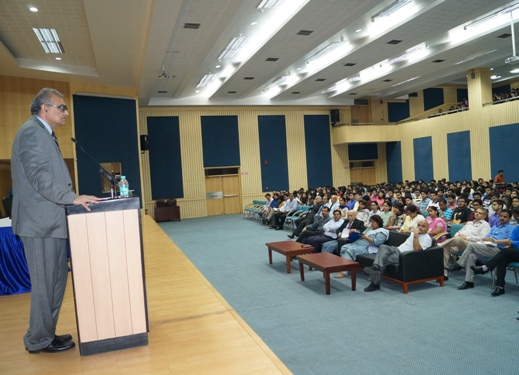20 Aug 2015|Noida | Amity University, Sector-125, Noida
Former Supreme Court Judge, Justice (Retd.) Markandey Katju delivers Lecture on “Judicial Activism and Judicial Restraint” at Amity
 “Judiciarycan create Laws where Legislative fails. There havebeen numerous cases around the world when Judges have made laws. Judges havethe power to expand the Law and play the Activists’ role but there should be aclear distinction between Judicial Outreach and Judicial Activism, keeping inview the betterment of society” stressed Former Supreme Court Judge, Justice(Retd.) Markandey Katju, while delivering a lecture on “Judicial Activism andJudicial Restraint” at Amity Law School, Noida, University Campus, Sector-125,Noida.
“Judiciarycan create Laws where Legislative fails. There havebeen numerous cases around the world when Judges have made laws. Judges havethe power to expand the Law and play the Activists’ role but there should be aclear distinction between Judicial Outreach and Judicial Activism, keeping inview the betterment of society” stressed Former Supreme Court Judge, Justice(Retd.) Markandey Katju, while delivering a lecture on “Judicial Activism andJudicial Restraint” at Amity Law School, Noida, University Campus, Sector-125,Noida.
Referringto the major lacuna in Indian Judiciary, he stressed that the delivery ofJustice needs to be expedited, in the absence of which people are gettingdisillusioned. He stated that there are 32 million pending cases with IndianJudiciary and if there are no new cases filed, then also it would take 360years to clear the present backlog. He expressed his hope that the presentgeneration of Lawyers would take the reigns in their hands and work activelytowards the betterment of Judiciary as well as Society.
Duringthe lecture, he shared his opinion on various topical cases having immenseimpact on the society. He citied various cases wherein Judges have played therole of Activists, trying to change Laws in the favor of society including the scrappingof 22 year old Collegium System of Judges appointing Judges. He, at thesame time, cautioned that Judges cannot be expected to solve every problemand every time, they should not act as Activist, trying to take over Statutoryauthorities.
Citingthe recent orders of Allahabad High Court for UP Officials and Politicians tosend their kids to Government Primary Schools, Justice Katjuopined that Courts are there to enforce the Laws and there are no Laws existingin this particular case to be enforced. He asserted that there is a cleardemarcation of powers laid down in the Constitution of India and Judiciary,barring few urgent cases, should not encroach into the domain of Legislature,following certain legal principles.
Hestated that although, the “Right to Privacy” is not mentioned expressively inthe Constitution of India but it is a Penumbra Right which emanates from otherexpressive rights mentioned in the Constitution.
Referringto the growing culture of same sex marriage in India, Justice (Retd.) Katjustressed that although the same sex marriages have become a fashion in Indiaand people have the right to live their lives the way they want but he himselfconsiders same sex marriages “Unnatural”.
Sharinghis views on the hanging of Yakub Memon’s case, Justice (Retd.) Katjusaid that the evidences based on which Yakub was hanged, were very weak. Hiscase was decided on the basis of retracted confession of the co-accused, hisown confession and alleged recoveries. He blamed a section of the Judiciarywhich became populist and wanted to send a strong message of non-tolerance ofterrorism that led to the travesty of justice in Yakub Memon’s case.
Maj Gen (Prof.)Nilendra Kumar- Director, Amity Law School and Director General, AmityDirectorate of Research and Innovation in Law and Allied Areasthanked Justice Katju for sharing precious nuggets of wisdom with the buddinglawyers.
Students from Amity LawSchool, Delhi and Amity Law Schools, Noida including Amity Institute ofAdvanced Legal Studies attended the lecture.